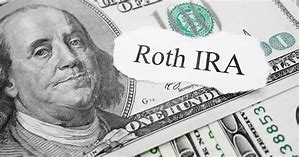The Pros & Cons of Roth IRA Conversions
What are the potential benefits? What are the drawbacks?
Provided by Marc Aarons @ Money Managers, Inc.
If you own a traditional IRA, perhaps you have thought about converting it to a Roth IRA. Going Roth makes sense for some traditional IRA owners, but not all.
Why go Roth? There is an assumption behind every Roth IRA conversion – a belief that income tax rates will be higher in future years than they are today. If you think that will happen, then you may be compelled to go Roth. After all, once you are age 59½ and have had your Roth IRA open for at least five years (five calendar years, that is), withdrawals of the earnings from your Roth IRA are exempt from federal income taxes. You can withdraw your Roth IRA contributions tax free and penalty free at any time.1,2
Additionally, you never have to make mandatory withdrawals from a Roth IRA, and if your income permits, you can make contributions to a Roth IRA as long as you live.2
For 2017, the contribution limits are $135,000 for single filers and $199,000 for joint filers, with phase-out ranges respectively starting at $120,000 and $189,000. (These numbers represent modified adjusted gross income.)2
While you may make too much to contribute to a Roth IRA, you have the option of converting a traditional IRA to a Roth. Imagine never having to draw down your IRA each year. Imagine having a reservoir of tax-free income for retirement (provided you follow Internal Revenue Service rules). Imagine the possibility of those assets passing to your heirs without being taxed. Sounds great, right? It certainly does – but the question is: can you handle the taxes that would result from a Roth conversion?1,3
Why not go Roth? Two reasons: the tax hit could be substantial, and time may not be on your side.
A Roth IRA conversion is a taxable event. The I.R.S. regards it as a payout from a traditional IRA prior to that money entering a Roth IRA, and the payout represents taxable income. That taxable income stemming from the conversion could send you into a higher income tax bracket in the year when the conversion occurs.2
If you are nearing retirement age, going Roth may not be worth it. If you convert a large traditional IRA to a Roth when you are in your fifties or sixties, it could take a decade (or longer) for the IRA to recapture the dollars lost to taxes on the conversion. Model scenarios considering “what ifs” should be mapped out.
In many respects, the earlier in life you convert a regular IRA to a Roth, the better. Your income should rise as you get older; you will likely finish your career in a higher tax bracket than you were in when you were first employed. Those conditions relate to a key argument for going Roth: it is better to pay taxes on IRA contributions today than on IRA withdrawals tomorrow.
On the other hand, since many retirees have lower income levels than their end salaries, they may retire to a lower tax rate. That is a key argument against Roth conversion.
If you aren’t sure which argument to believe, it may be reassuring to know that you can go Roth without converting your whole IRA.
You could do a multi-year conversion. Is your traditional IRA sizable? You could spread the Roth conversion over two or more years. This could potentially help you avoid higher income taxes on some of the income from the conversion.2
Roth IRA conversions can no longer be recharacterized. Prior to 2018, you could file a form with your Roth IRA custodian or trustee to undo a Roth IRA conversion. The recent federal tax reforms took away that option. (Roth IRA conversions made during 2017 may still be recharacterized as late as October 15, 2018.)2
You could also choose to “have it both ways.” As no one can fully predict the future of American taxation, some people contribute to both Roth and traditional IRAs – figuring that they can be at least “half right” regardless of whether taxes increase or decrease.
If you do go Roth, your heirs might receive a tax-free inheritance. Lastly, Roth IRAs can prove to be very useful estate planning tools. If I.R.S. rules are followed, Roth IRA heirs may end up with a tax-free inheritance, paid out either annually or as a lump sum. In contrast, distributions of inherited assets from a traditional IRA are routinely taxed.3
Marc Aarons, 714-887-8000 or marc@ocmoneymanagers.com
MMI Disclosures
Citations.
1 – cnbc.com/2017/07/05/three-retirement-savings-strategies-to-use-if-you-plan-to-retire-early.html [7/5/17]
2 – marketwatch.com/story/how-the-new-tax-law-creates-a-perfect-storm-for-roth-ira-conversions-2018-03-26 [3/26/18]
3 – time.com/money/4642690/roth-ira-conversion-heirs-estate-planning/ [1/27/17]
This material was prepared by MarketingPro, Inc., and does not necessarily represent the views of the presenting party, nor their affiliates. This information has been derived from sources believed to be accurate. Please note – investing involves risk, and past performance is no guarantee of future results. The publisher is not engaged in rendering legal, accounting or other professional services. If assistance is needed, the reader is advised to engage the services of a competent professional. This information should not be construed as investment, tax or legal advice and may not be relied on for the purpose of avoiding any Federal tax penalty. This is neither a solicitation nor recommendation to purchase or sell any investment or insurance product or service, and should not be relied upon as such. All indices are unmanaged and are not illustrative of any particular investment.

Comments are closed